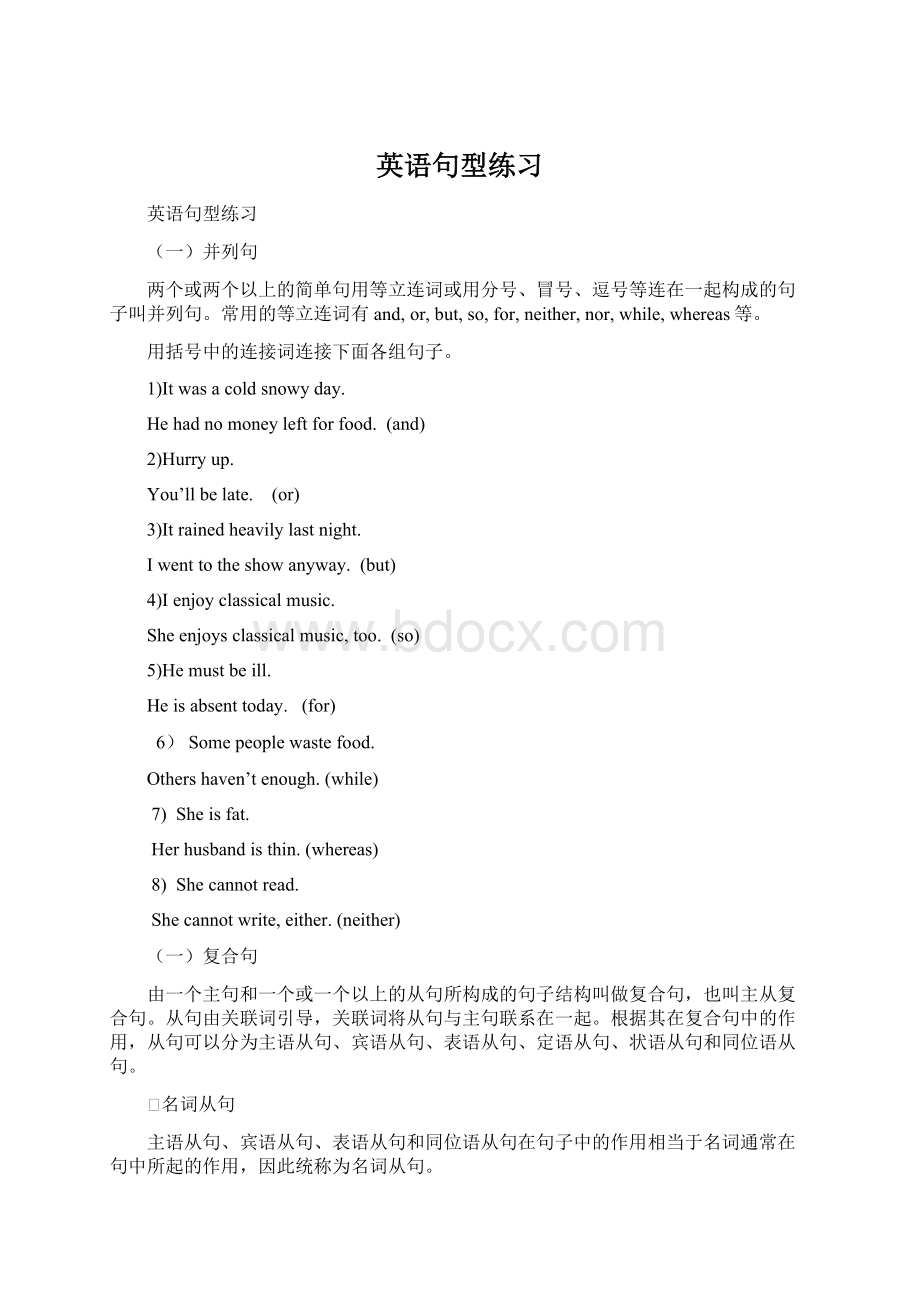英语句型练习.docx
《英语句型练习.docx》由会员分享,可在线阅读,更多相关《英语句型练习.docx(29页珍藏版)》请在冰豆网上搜索。

英语句型练习
英语句型练习
(一)并列句
两个或两个以上的简单句用等立连词或用分号、冒号、逗号等连在一起构成的句子叫并列句。
常用的等立连词有and,or,but,so,for,neither,nor,while,whereas等。
用括号中的连接词连接下面各组句子。
1)Itwasacoldsnowyday.
Hehadnomoneyleftforfood.(and)
2)Hurryup.
You’llbelate.(or)
3)Itrainedheavilylastnight.
Iwenttotheshowanyway.(but)
4)Ienjoyclassicalmusic.
Sheenjoysclassicalmusic,too.(so)
5)Hemustbeill.
Heisabsenttoday.(for)
6)Somepeoplewastefood.
Othershaven’tenough.(while)
7)Sheisfat.
Herhusbandisthin.(whereas)
8)Shecannotread.
Shecannotwrite,either.(neither)
(一)复合句
由一个主句和一个或一个以上的从句所构成的句子结构叫做复合句,也叫主从复合句。
从句由关联词引导,关联词将从句与主句联系在一起。
根据其在复合句中的作用,从句可以分为主语从句、宾语从句、表语从句、定语从句、状语从句和同位语从句。
Ø名词从句
主语从句、宾语从句、表语从句和同位语从句在句子中的作用相当于名词通常在句中所起的作用,因此统称为名词从句。
引导名词从句的关联词,主要有三类:
1.主从连词:
that(无词义),whether(是否),if(是否)
2.连接代词:
who(谁),whom(谁),whose(谁的),what(什么),which(哪一个,哪一些)
3.连接副词:
when(什么时候),where(什么地方),why(为什么),how(怎样)
主从连词只起连接作用;连接代词和连接副词除了起连接作用外,还充当句中某一个成
分。
1.将下面每组中的两个句子合并,将其中一个改为主语从句。
1)TheyneedmorehelpinEnglish.
Thatisquiteobvious.
2)Sheisstillalive.
Thatisgoodnews.
3)Shewillcomehere.
Itdoesn’tseemlikely.
4)Thechildrencametothezoo.
Theylikethepandasbest.
5)Wearebadlyinneedofsomething.
Itisrawmaterial.
2.将下面每组中的词连成句子,使其中包含主语从句。
1)didnot,apity,he,comeearlier,it’s,that
2)smoking,itis,cause,awell-knownfact,lungcancer,can,that
3)encouragedhim,itis,but,helphim,true,actually,I,that,didn’t
4)they,keeptheirpromise,didn’t,seem,it,likely,that,wouldever
5)why,forcriticism,hardtounderstand,hadsingledout,Mary,itwas,Prof.Hardy
3.将下面每组中的两个句子合并,将其中一个改为宾语从句。
1)Whatkindofshowaretheyputtingon?
Canyoutellme?
2)Istheletteroverweight?
I’mwondering.
3)Howcanweimproveourstudyhabits?
Iamthinkingofthat.
4)IsHenrytherightpersonforthejob?
Wearestilluncertainastothat.
5)Peterhasaslightheadachesometimes.
Hehasalwaysbeeningoodhealthexceptthat.
6)Hehadforgottentotakehisnotebookwithhim.
Hesuddenlyrememberedthat.
4.将下面每组中的两个句子合并,将其中一个改为宾语从句,并且用it作形式宾语。
1)Iwasfarmoreintelligentthanhewas.
Ialwaystookthatforgranted.
2)Youwereunabletoattendourmeeting.
Weallthoughtthatwasapity.
3)Youshouldmindyourmanners.
Weconsiderthatisimportant.
4)Hewastooilltogoonworking.
Hedidn'twantthattobeknown.
5)Everyoneofyoushouldfinishyourhomeworkontime.
Iregardthatasimportant.
6)Hisfatherwouldcometohishelpifhegotintotrouble.
Hetookthatforgranted.
7)Hemightchangehismindatthelastminute.
Wethoughtthatwashighlyprobable.
8)Thetrainwillbedelayedbythedensefog.
Ithinkthatislikely.
9)Youshouldstopsmoking.
Thedoctorthinksthatisadvisable.
5.用“what”从句将下列句子补充完整。
1)Couldyoushowme______(you,write)?
2)Thisis________(we,shouldalways,keepinmind).
3)(they,see)_______inChinamadeadeepimpressiononthem.
4)Wemustnotputofftilltomorrow______(we,can,do,today).
6.将下面每组中的两个句子合并,将其中一个改为同位语从句。
1)Heisgrowingold.
Nothingcouldhidethefact.
2)Heworkshard.
Thefactdoesnotnecessarilymeanthatheisacompetentleader.
3)Ihaveacomplacentfeeling.
IfeelthatI’mhighlyintelligent.
4)Heexplainedthathedidn’tseethenotice.
Theexplanationisunsatisfactory.
5)Heholdsthatthereisnoadvantageinintroducingthenewmethod.
Mostofusdon’tagreewithhisview.
6)Hewonthefirstgoldmedalatthe23rdOlympicGames.
Thenewssoonspreadthroughoutthecountry.
7)Hehassuggestedthatintelligenceisarelativematter.
Hissuggestionisnotuniversallyaccepted.
8)Imovedthatthevotebepostponed.
Hesecondedmymotion.
9)Hefearedthathemightnotbeabletofinishthework.
Thefeardisturbedhimgreatly.
10)Weexpressedahope.
ThathopewasthatMr.andMrs.MorrisonwouldcomeandvisitChinaagain.
11)I’vecomefromMr.Linwithamessage.
Itsaysthathewon’tbeabletoseeyouthisafternoon.
12)Suzyistherightpersonforthejob.
Therecanbenodoubtaboutit.
Ø定语从句
在复合句中修饰名词或代词的从句是定语从句。
被定语从句修饰的词叫先行词。
定语从句必须放在先行词的后面。
定语从句一般由关系代词that,which,who,whom,whose和关系副词when,where,why引出。
关系代词和关系副词有两个作用:
1、把主句和从句连接起来;2、在从句中作一个成分。
which,that,who在从句中作主语或宾语;whom作宾语;whose作定语。
when,where,why在从句中作状语。
关系代词that,which,who,whom如果在从句中作宾语,也可以省略。
另外,如果which或whom在定语从句中原为介词的宾语,则这个介词可以提到从句前,构成介词+which或whom引出的定语从句。
定语从句根据与先行词的密切程度可分为限制性定语从句和非限制性定语从句。
限制性定语从句与先行词关系密切,从句是整个句子不可缺少的部分,去掉之后句子的意思就不完整,不明确,从句与主句之间不用逗号隔开。
非限制性定语从句与先行词的关系比较松散,从句只是对先行词的附加说明,去掉之后句子的意思仍然很清楚,从句与主句之间常用逗号隔开。
将下面每组中的两个句子合并,将其中一个改为定语从句。
1)IwenttovisittheAmericanauthor.
HewroteanumberofbooksaboutChina.
2)Myauntpreparedthesoup.
Iatethesoup.
3)Ihaveanarrangementwithmybank.
Bythearrangementtheyletmeusetheirmoneyandrepaythemnextmonth.
4)Hesentheraletter.
Intheletterhesaidthathewassorryforwhathehaddonetoher.
5)Mr.BrownjustcamefromBritainyesterday.
Hewillteachusaccountingthisterm.
6)SheisgoingtospendthewinterholidaysinHainan.
Shehassomerelativesthere.
7)TheUnitedStatesisknownforitssupermarkets.
Inthesesupermarkets,hugequantitiesofallkindsoffoodandhouseholdarticlesaresold.
8)Thestoryhappenedinlate19thcentury.
Atthattime,Chinaissufferingfromtheinvasionofwesternpowers.
Ø状语从句
状语从句按其意义可以分为时间、地点、原因、目的、结果、条件、方式、让步等类别。
其引导词分别如下:
时间状语从句:
when,after,before,as,while,whenever,since,once,until,assoonas
地点状语从句:
where,wherever
原因状语从句:
because,as,since,nowthat
目的状语从句:
sothat,inorderthat,lest
结果状语从句:
sothat,so…that,such…that
条件状语从句:
if,unless,suppose(supposing),provided(that),providing(that),oncondition(that),incase,as(so)longas
方式状语从句:
as,asif(though)
让步状语从句:
though,although,evenif(though),however,whatever,nomatterhow(what,where,when),whether…or
将下面每组中的两个句子合并,将其中一个改为状语从句。
(aslongas,onconditionthat,lest,so…that,such…that,incase,asif,nowthat,whether…or,however,)
1)You’veboughtanewcar.
Whatareyougoingtodowiththeoldone?
2)We’dbettertakethetelescopewithus.
Perhapsitisneeded.
3)Wemusthurryoff.
Otherwise,wemightmissthebus.
4)Theproblemwasverycomplicated.
Ittookusnearlytwoweekstosolveit.
5)Theaircraftwasflyingataveryhighaltitude.
Wecouldhardlyseeit.
6)I’lllendyoumycomputer.
Theconditionisthatyoukeepitingoodshape.
7)Youcangoout.
Butyoushouldpromisetobebackbefore11atnight.
8)Irememberthewholething.
Itseemsthatithappenedyesterday.
9)Hetriedveryhard.
Buthecouldnotdothejobsatisfactorily.
10)Itmaytakeanhourorevenawholeday.
ButIshallfindouttheanswer.
(二)复杂的简单句
并列句和复合句往往可以浓缩成复杂的简单句,使语言更为紧凑、多样。
1.表示时间、让步或条件的状语从句往往可以改写为介词词组作状语。
1)Theylookedbothwaysbeforetheycrossedthestreet.
2)ImademydecisionafterItalkedtoSirFrancis.
3)Althoughhewasill,hewasdeterminedtocarryouthisplan.
4)Althoughthey’reintelligent,theyaren’tdoingwellinschool.
5)Althoughhe’srich,heisn’tveryhappy.
6)Althoughhe’stall,heisn’taverygoodbasketballplayer.
7)Ifwehadyoursupport,wemightsucceedinperformingourtask.
8)Eveniftherewereairandwater,plantsstillcouldn’tgrowonthemoon.
9)Ifyoudon’tworkhard,youwillaccomplishnothing.
10)Ifithadnotbeenfortheirassistance,hewouldhavefoundhimselfintrouble.
2.起伴随或补充说明作用的从句、简单句或并列谓语往往可以改写为“with+名词+分词/形容词/介词词组”的结构作状语。
1)Theywearlayersofclotheseveninsummertime.Newspapersarestuffedbetweenthelayersasfurtherprotectionagainstbadweather.
2)Ifmorepeoplehelpthem,theyprobablywillbeabletoaccomplishthetaskaheadoftime.
3)Asallhissavingsweregone,hestartedtolookforajob.
4)Inthecornerthereisatable.Oneofitslegsisshorterthantheothers.
5)Whenthejobwasfinished,wewenttotheseasideforaholiday.
6)Asthepaceofchangeisquickening,moreandmorescientistsfindithardtokeepupwiththelatestdevelopmentsevenintheirowndisciplines.
7)Shelookedinmyfaceandtearsstreameddownhercheeks.
3.还有另外一些从句或简单句也可以改写为介词词组作状语。
1)Shewon’tgohomeuntilshehastakentheexam.
2)Becausehehadabadleg,hecouldn’twalkasfastastheothers.
3)Wearefullawarethatthesituationisserious.
4)Shehurriedbacktoschoolforfearthatshemisstoomanylessons.
5)WeshouldnotcriticizeSusanforwhatshehasdone.Instead,weoughttopraiseherforit.
6)Helendidnotgostraighthomeafterschool.Shewenttoworkasawaitressinarestaurant.
7)IamnotgoingtosendthebooktoAllanbypost.Iamgoingtotakeittohimmyself.
8)Dr.WilsondidnotgotoNewYorkyesterdaytoattendhisdaughter’swedding.HeflewtoFloridaforanemergencycase.
4.系表结构的定语从句往往可以改写为直接用形容词、介词词组或分词结构作定语。
1)Ilovegirlswhoareintelligent
2)Attheparty,Igottoknowaprofessorwhoisinhisthirties.
3)Ihatetoseelettersthatarewritteninpencil.
4)Thesubstance,whichwasdiscoveredalmostbyaccident,hasrevolutionizedmedicine.
5)Amongthosewhoaretakingpartinthework,heisprobablythemostactive.
5.两个句子的主语一致时,其中一个往往可以改写成分词结构作状语。
1)Everyoneofushadbeenconvincedthattheprojectwasfeasiblebythetimeweleftthemeeting.
2)AsPetergothomefromthethree-month-longjourneytotheAntarctichelookedtiredout.
3)Theywenthuntingforhours,butwhentheyreturnedtheywereempty-handed.
4)Whenheenteredtheofficehewasstillannoyedbythewayshespoketohim.
5)Teenagersarepressuredbyschoolwork.Theyarealsoencouragedbytheirpeers. Undersuchcircumstances,theyresorttosmoking.
6)Collegestudentsnowareprimarilyinterestedingradesandeconomicsuccess.They cheatonexamsmoref